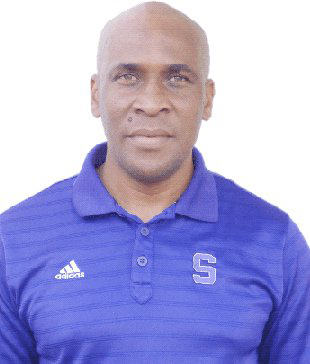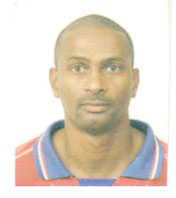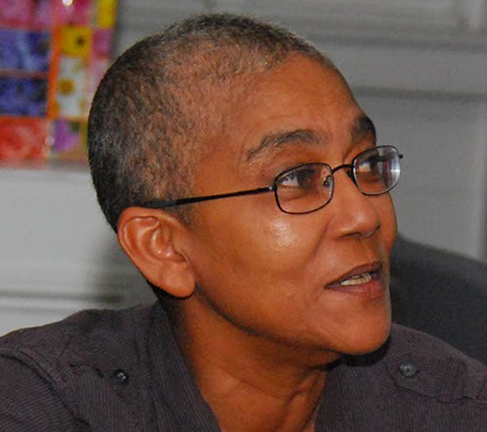Head of Red Thread Karen de Souza has described the recent investigation into claims of sexual harassment made by women football referees as a “big step forward” in terms of the hierarchy of the Guyana Football Federation (GFF) taking things seriously and being prepared to protect members and players.
She expressed the hope that this will provide a signal to other sports organisations to follow the lead and even to go further and engage members in crafting protocols for sexual conduct and relations between members of associations.
A recently conducted Commission of Inquiry (COI) recommended the removal of GFF’s Head of Referees Stanley Lancaster and Referee Assessor Roy MacArthur from their respective posts, well-placed sources say.

The all-woman commission which oversaw the investigation comprised Guyana Olym-pic Association Vice-President Dr Karen Pilgrim, Dr Melissa Ifill of the University of Guyana, Human Resources Consultant Karen Joseph and Joy Nichola Marcus-Reid of the Red Thread Organisation.
De Souza was listed as being on the panel, but said that while she had agreed to be part of it, her schedule clashed with the meeting dates so she was not part of the investigative process.
The Sunday Stabroek understands that the members of the COI team signed a non-disclosure clause and as such cannot speak to the evidence that was presented. However, information reaching this newspaper indicate that some 26 men and women testified.

The probe was triggered by a three-page letter dated February 2, 2018 and signed by 17 men and women referees, which called for the removal of Lancaster, citing unprofessionalism and incompetence, amongst other issues.
“The primary recommendation is the removal of GFF Head of Referees Department Stanley Lancaster and Referee Assessor Roy MacArthur. Many of the testimonies and stories received by the committee did not sound scripted or rehearsed, they felt genuine. The recommendations for their removal is based on the belief and credibility that incidents occurred. Although there was no physical evidence, many of the individuals… had different experiences and stories,” a source had told this newspaper.
Signal
“I think it may be a signal that increasingly, women are… recognising that they do not have to accept certain types of abuse and that in fact certain types of behaviour is abuse. And I think in the sports world where the people in authority also have the power to decide whether you progress… or not it was really striking…,” de Souza said of the investigation.
She said it was unclear whether the investigation was triggered by an extremely good player not being given play time or whether the behaviour of officials was so outrageous, but it signals that the country is moving forward in terms of victims and survivors being prepared to stand up and insist on their rights being respected.
It is still to be seen whether the association would follow through with the recommendations made and de Souza pointed out that there is still a lot of work left to be done in terms of the infrastructure of sports.
“My understanding is that in most of the places there are no changing facilities, no toilet facilities for women players. I don’t know if it is the same thing that happens in cricket, but we are coming out of a history where women don’t play certain sports and the infrastructure of that sport continues with that view and so some expenditure has to be done to ensure that [women are adequately catered for],” de Souza said.
She pointed out that as a society we cannot close our eyes to the possibility that women can also be abusers.
“While they are a small minority…they [women] may also be behaving inappropriately. A part of the thing is that we have these assumptions in terms of sexual behaviour that a woman cannot be the aggressor and that a woman cannot behave in a sexually offensive way and it is not true,” de Souza said.
She noted that there are many stories of adolescent boys who are conditioned to be flattered if an older woman gives them some sexual attention. Guyana’s Sexual Offences Act, de Souza stated, calls that behaviour sexual assault.
There is need for a change in thinking around such behaviours, she said.
De Souza believes that in every sports organisation there should be some protocol or policy as it relates to sexual harassment and protection of members and people who are engaged in the game.
“We also need to have that in just about every workplace… I know of one workplace that actually invited somebody to come in and work with the staff around sexual harassment and putting together a policy and the workers were actually involved,” the Red Thread head told the Sunday Stabroek.
‘Pretty bad place’
And as Guyana joins the world in recognising the 16 days of activism as it relates to gender-based violence, de Souza said if one is to just scan newspaper headlines, one would see that Guyana “is in a pretty bad place” as it relates to this issue.
The 16 Days of Activism Against Gender-Based Violence is an international campaign to challenge violence against women and girls. The campaign runs every year from November 25, designated International Day for the Elimination of Violence against Women, to December 10, which is Human Rights Day.
“We are still not beginning to do the work around non-violence that needs to be done. We have to, very importantly, work with kids from nursery school, throughout the school system, to teach them about non-violent engagement and teach them how to relate to others and how to deal with differences and we are not doing that,” she said.
Notwithstanding all the legislation the country has enacted, de Souza said, nothing is really happening.
“And so, yes, you can have this symposium, you can have this publicity thing…, but the consistent work that is about changing behaviours and changing people’s attitudes to certain things is not happening. And certainly at the level of institutions, the work to alter relations within institutions is not happening,” the activist said.
She believes the country is still not being serious about addressing violence in any of its dimensions.
De Souza was asked about her assessment of the case of Rohanie Lakhan, the Corentyne woman who was killed in August after the police officer who accompanied her to collect her belongings left her alone with her abusive husband.
She said that from the reports she read, part of the problem was that the policewoman did not appreciate the extent of danger the woman was in.
“That is one of the things, it is sometimes absolutely not possible to judge how violent an abuser might choose to be… It is also about how much training they have had because one of the most dangerous times in an abusive relationship is when a woman decides that she is going to go and makes preparation to leave,” she said.
She added that women, also, to a certain extent, do not necessarily appreciate how dangerous that period is.
She opined that what happened in Berbice was a failure of the training ranks in the force received, as the
policewoman may not have understood how critical the job of accompanying a victim to collect her things was.
“We are still in a place where the average person and police officials will feel that the woman ‘will beg for he’ and the woman will change her mind about getting to a place of safety and so ‘why am I harassing myself’,” she noted.
There is a need to understand the kind of pathology that operates in that violent relationship so that we are not that dismissive of a woman who has difficulty leaving and so that she can be helped even when she is unaware of the danger she is in, she added.
According to de Souza, the police have all the tools needed to address domestic violence but the problem comes with putting those tools in practice. She pointed out that the most comprehensive training the force had was with Janice Jackson; it was done over a period of time and saw the force design protocols, posters and a system for snowballing the training. It was not about training a group of officers, but rather trainers were trained and a system was worked out to how the training would have been done for the rest of the force but that was completely abandoned.
“But it is there. They put together manuals. And so I keep on saying, of all the agencies in this country, the police have been the most thoroughly trained… they are the most important institution at the point of view of corrective actions,” she said.
She noted that there is a reluctance to take the issue seriously and she is not sure what it will take for an agency like the police force to recognise that “domestic violence has to be treated in the same way any other crime against a person is treated. It must be investigated and it must be prosecuted.”
While the other agencies have work to do around prevention and other areas it is the police who must understand what they have to do.
Project Manager of the Citizens’ Security Strengthening Programme (CSSP) Dr Clement Henry recently told this newspaper that work was being done with the force in this area.
“Not only are we putting the systems in place for them to report but we are working with the police… to standardize their SOPs [Standard Operating Procedures] when it comes to responding to domestic violence,” he had said.
At the end of this, he said, there should be a standard way in terms of how the police respond to domestic violence reports, while an inter-agency protocol will also be developed so that every agency involved in the process understands its role.









